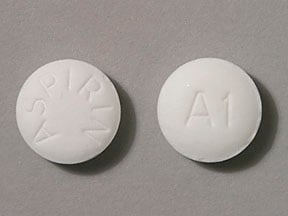
Eq Aspirin Coupons & Savings Card – Discount Prices from $3.83
Brand for: Aspirin
Aspirin is a medication primarily used to lower fever and relieve mild to moderate pain associated with conditions like muscle aches, toothaches, the common cold, and headaches. Additionally, it can alleviate pain and swelling linked to arthritis. As a salicylate and nonsteroidal anti-inflammatory drug (NSAID), aspirin functions by inhibiting a specific natural substance in the body, thereby reducing pain and swelling. For children under 12 years, consult a doctor before use. In some cases, doctors may recommend a low dose of aspirin to prevent blood clots, which can help reduce the risk of stroke and heart attack. After certain surgeries involving clogged arteries, such as bypass surgery, carotid endarterectomy, or coronary stent placement, a doctor might advise using low-dose aspirin as a "blood thinner" to prevent blood clots.
Our Eq Aspirin coupons are free to use. You can print the coupon, email it to yourself, or receive the Eq Aspirin coupon via text message. To get your free discount, show the pharmacist your Eq Aspirin savings card which has the discounted coupon price. Use our filters below to edit the prescription box to match your needs. The Eq Aspirin prices will update based on your prescription needs. Above our Eq Aspirin coupons, you can change the location to see pharmacy prices in other areas. Our prescription discount card will update online with the specific pharmacy costs associated with your edits. Be sure to text, email, or print the Eq Aspirin savings card code that you need after editing the prescription box and location field. Show the discount card to your pharmacist before paying.
My prescription
Edit
325MG, Aspirin (30 Tablets)
Select pharmacy

Albertsons
$3.83
COUPON PRICE
Walgreens
$3.83
COUPON PRICEEq Aspirin savings card
Show this card to your pharmacist
Albertsons
$3.83
BIN
ID
PCN
GRP
011867
LHB5C65728
HT
LABH001
Powered by
Aspirin is a medication primarily used to lower fever and relieve mild to moderate pain associated with conditions like muscle aches, toothaches, the common cold, and headaches. Additionally, it can alleviate pain and swelling linked to arthritis. As a salicylate and nonsteroidal anti-inflammatory drug (NSAID), aspirin functions by inhibiting a specific natural substance in the body, thereby reducing pain and swelling. For children under 12 years, consult a doctor before use. In some cases, doctors may recommend a low dose of aspirin to prevent blood clots, which can help reduce the risk of stroke and heart attack. After certain surgeries involving clogged arteries, such as bypass surgery, carotid endarterectomy, or coronary stent placement, a doctor might advise using low-dose aspirin as a "blood thinner" to prevent blood clots.
Our Eq Aspirin coupons are free to use. You can print the coupon, email it to yourself, or receive the Eq Aspirin coupon via text message. To get your free discount, show the pharmacist your Eq Aspirin savings card which has the discounted coupon price. Use our filters below to edit the prescription box to match your needs. The Eq Aspirin prices will update based on your prescription needs. Above our Eq Aspirin coupons, you can change the location to see pharmacy prices in other areas. Our prescription discount card will update online with the specific pharmacy costs associated with your edits. Be sure to text, email, or print the Eq Aspirin savings card code that you need after editing the prescription box and location field. Show the discount card to your pharmacist before paying.
Eq Aspirin (Aspirin) dosage forms
Use our Eq Aspirin (Aspirin) 325MG coupon with prices from $7.55 for 30 Tablets. You can also use our Eq Aspirin (Aspirin) 325MG coupon with prices from $7.52 for 10 Tablets. We have a Eq Aspirin (Aspirin) 325MG coupon with prices from $7.52 for 14 Tablets. You can use our Eq Aspirin (Aspirin) 325MG coupon with prices from $7.52 for 15 Tablets.
Dosage Quantity Price from Per unit 325MG 30 Tablets $7.55 $0.25 325MG 10 Tablets $7.52 $0.75 325MG 14 Tablets $7.52 $0.54 325MG 15 Tablets $7.52 $0.50 325MG 20 Tablets $7.53 $0.38 325MG 24 Tablets $7.54 $0.31 325MG 60 Tablets $7.59 $0.13 325MG 100 Tablets $7.65 $0.08 325MG 250 Tablets $7.88 $0.03 325MG 300 Tablets $7.95 $0.03
| Dosage | Quantity | Price from | Per unit |
|---|---|---|---|
| 325MG | 30 Tablets | $7.55 | $0.25 |
| 325MG | 10 Tablets | $7.52 | $0.75 |
| 325MG | 14 Tablets | $7.52 | $0.54 |
| 325MG | 15 Tablets | $7.52 | $0.50 |
| 325MG | 20 Tablets | $7.53 | $0.38 |
| 325MG | 24 Tablets | $7.54 | $0.31 |
| 325MG | 60 Tablets | $7.59 | $0.13 |
| 325MG | 100 Tablets | $7.65 | $0.08 |
| 325MG | 250 Tablets | $7.88 | $0.03 |
| 325MG | 300 Tablets | $7.95 | $0.03 |
| 325MG | 500 Tablets | $8.26 | $0.02 |
| 325MG | 1000 Tablets | $9.01 | $0.01 |
| 325MG | 45000 Tablets | $75.46 | $0.00 |
Eq Aspirin FAQs
Using the SaveHealth discount card, what is the price of Eq Aspirin without insurance?
Using the SaveHealth discount card, the price of Eq Aspirin without insurance is $3.83.
What is the price of Eq Aspirin at Walgreens?
The price of Eq Aspirin at Walgreens is $3.83.
